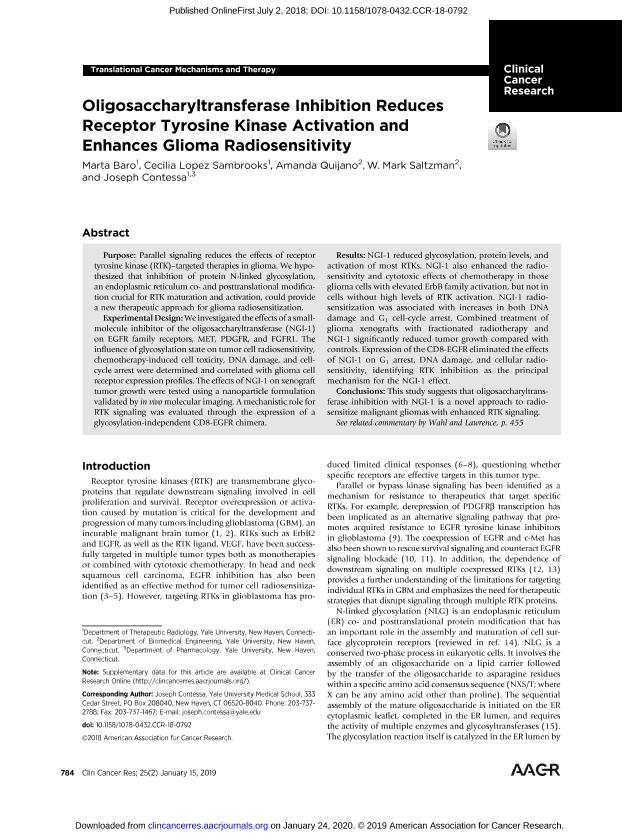Artículo
Oligosaccharyltransferase inhibition reduces receptor tyrosine kinase activation and enhances glioma radiosensitivity
Barontini, Marta Beatriz ; López Sambrooks, Cecilia
; López Sambrooks, Cecilia ; Quijano, Amanda; Mark Saltzman, W.; Contessa, Joseph
; Quijano, Amanda; Mark Saltzman, W.; Contessa, Joseph
 ; López Sambrooks, Cecilia
; López Sambrooks, Cecilia ; Quijano, Amanda; Mark Saltzman, W.; Contessa, Joseph
; Quijano, Amanda; Mark Saltzman, W.; Contessa, Joseph
Fecha de publicación:
01/2019
Editorial:
American Association for Cancer Research
Revista:
Clinical Cancer Research
ISSN:
1078-0432
Idioma:
Inglés
Tipo de recurso:
Artículo publicado
Clasificación temática:
Resumen
Purpose: Parallel signaling reduces the effects of receptor tyrosine kinase (RTK)–targeted therapies in glioma. We hypothesized that inhibition of protein N-linked glycosylation, an endoplasmic reticulum co- and posttranslational modification crucial for RTK maturation and activation, could provide a new therapeutic approach for glioma radiosensitization. Experimental Design: We investigated the effects of a small-molecule inhibitor of the oligosaccharyltransferase (NGI-1) on EGFR family receptors, MET, PDGFR, and FGFR1. The influence of glycosylation state on tumor cell radiosensitivity, chemotherapy-induced cell toxicity, DNA damage, and cell-cycle arrest were determined and correlated with glioma cell receptor expression profiles. The effects of NGI-1 on xenograft tumor growth were tested using a nanoparticle formulation validated by in vivo molecular imaging. A mechanistic role for RTK signaling was evaluated through the expression of a glycosylation-independent CD8-EGFR chimera. Results: NGI-1 reduced glycosylation, protein levels, and activation of most RTKs. NGI-1 also enhanced the radiosensitivity and cytotoxic effects of chemotherapy in those glioma cells with elevated ErbB family activation, but not in cells without high levels of RTK activation. NGI-1 radiosensitization was associated with increases in both DNA damage and G 1 cell-cycle arrest. Combined treatment of glioma xenografts with fractionated radiotherapy and NGI-1 significantly reduced tumor growth compared with controls. Expression of the CD8-EGFR eliminated the effects of NGI-1 on G 1 arrest, DNA damage, and cellular radiosensitivity, identifying RTK inhibition as the principal mechanism for the NGI-1 effect. Conclusions: This study suggests that oligosaccharyltransferase inhibition with NGI-1 is a novel approach to radio-sensitize malignant gliomas with enhanced RTK signaling.
Palabras clave:
RTK
,
Radiosensitization
,
Oligosaccharyltransferase
,
N-glycosylation
,
Glioma
Archivos asociados
Licencia
Identificadores
Colecciones
Articulos(CIQUIBIC)
Articulos de CENTRO DE INVEST.EN QCA.BIOL.DE CORDOBA (P)
Articulos de CENTRO DE INVEST.EN QCA.BIOL.DE CORDOBA (P)
Citación
Barontini, Marta Beatriz; López Sambrooks, Cecilia; Quijano, Amanda; Mark Saltzman, W.; Contessa, Joseph; Oligosaccharyltransferase inhibition reduces receptor tyrosine kinase activation and enhances glioma radiosensitivity; American Association for Cancer Research; Clinical Cancer Research; 25; 2; 1-2019; 784-795
Compartir
Altmétricas



